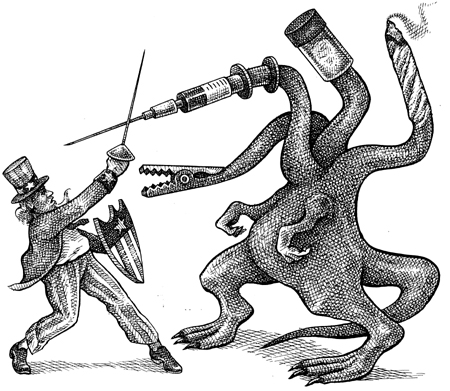There are many short-term and long-term health risks associated with using LSD, PCP, mushrooms and other powerful hallucinogens.
The “Flower Power” generation impacted society in many positive ways, but the lax attitude about drugs which fermented in the 1960s has had a negative impact on future generations. This can be seen in the continued abuse of LSD, mushrooms and other hallucinogens which were popularized for recreational use by the hippie generation. Unfortunately, the use of hallucinogens is not limited to aging baby boomer burnouts who ended up in drug treatment — recent statistics show that more than 14 percent of all Americans have tried hallucinogens including almost nine percent of all teens.
Drug addiction is common among people who experiment with hallucinogens; even though drugs like LSD are among the few that don’t increase a user’s tolerance for the drug over time, people will become psychologically dependent on the side effects of the drug. Over time, a person who abuses hallucinogenic drugs comes to believe that they cannot function in the “real” world and has to use drugs in order to cope. This causes people to gradually withdraw from friends and family and drop out of normal society if they don’t get into a drug and alcohol treatment center.
However, the potential danger for a person addicted to hallucinogens who doesn’t seek addiction treatment is more than just mental. There are substantial short-term and long-term health risks associated with the use of hallucinogens. Many of the health risks associated with LSD, PCP and other hallucinogens are unpredictable, meaning that a person who uses can experience a major health problem at any time.
Short-term health risks include an elevated heart rate and increased blood pressure. This can put a person at risk for a heart attack or stroke over time if they don’t seek treatment at a rehab center. Other short term physical problems associated with hallucinogenic drugs include dizziness, loss of appetite, dry mouth, sweating, nausea, numbness, and tremors.
However, the most serious health risks associated with hallucinogenic drugs are mental and go beyond having “a bad trip.” Long-term use of hallucinogens can create persistent psychosis and paranoia along with permanently altering a person’s ability to regulate their moods. People who use hallucinogens extensively essentially have their brain rewired, leading to scary flashbacks which can occur even after treatment in drug rehabilitation.
 Almost every drug and alcohol addict who has been through the motions knows that finding an appropriate
Almost every drug and alcohol addict who has been through the motions knows that finding an appropriate 